

Oddly Developed Types. Most type guides only present the nice, vague, boring facts...

But they won't tell you that INTPs are one of the introverted types most likely to get married. (And more than once, too.) Or that INTPs are the type predicted to do best on I.Q. tests. Unique learning. Leadership. Productivity Strategies. Learning Styles. Altruism. Giving alms to the poor is often considered an altruistic action.
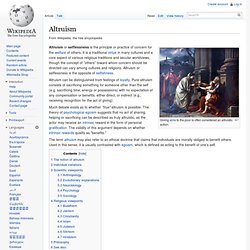
Altruism or selflessness is the principle or practice of concern for the welfare of others. It is a traditional virtue in many cultures and a core aspect of various religious traditions and secular worldviews, though the concept of "others" toward whom concern should be directed can vary among cultures and religions. Altruism or selflessness is the opposite of selfishness. Altruism can be distinguished from feelings of loyalty. Pure altruism consists of sacrificing something for someone other than the self (e.g. sacrificing time, energy or possessions) with no expectation of any compensation or benefits, either direct, or indirect (e.g., receiving recognition for the act of giving). Much debate exists as to whether "true" altruism is possible.
The notion of altruism[edit] The concept has a long history in philosophical and ethical thought. Individual variations[edit] A 1986 study estimated that altruism was half-inherited. The Virtue of Fortitude. DOUG MCMANAMAN The emotions have an innate need to be guided by reason.
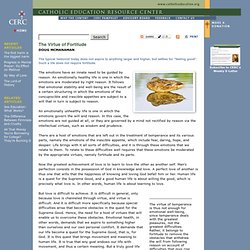
An emotionally healthy life is one in which the emotions are moderated by right reason. It follows that emotional stability and well-being are the result of a certain structuring in which the emotions of the concupiscible and irascible appetites are subject to a will that in turn is subject to reason. An INTP Profile. By Paul James Original version: April 5, 1999 revised and published on the web: March 12, 2000 INTP is one of the 16 personality types defined in the Myers Briggs Type Indicator (MBTI).
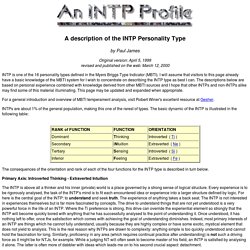
I will assume that visitors to this page already have a basic knowledge of the MBTI system for I wish to concentrate on describing the INTP type as best I can. The descriptions below are based on personal experience combined with knowledge derived from other MBTI sources and I hope that other INTPs and non-INTPs alike may find some of this material illuminating. This page may be updated and expanded when appropriate. For a general introduction and overview of MBTI temperament analysis, visit Robert Winer's excellent resource at Gesher. Collaboration is to Reduce Asymmetrical Information. Temperance (virtue) Prudence. Although prudence would be applied to any such judgment, the more difficult tasks, which distinguish a person as prudent, are those in which various goods have to be weighed against each other, as when a person is determining what would be best to give charitable donations, or how to punish a child so as to prevent repeating an offense.
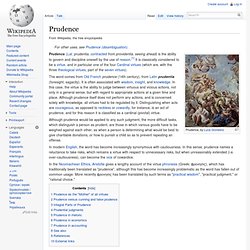
In modern English, the word has become increasingly synonymous with cautiousness. In this sense, prudence names a reluctance to take risks, which remains a virtue with respect to unnecessary risks, but when unreasonably extended (i.e. over-cautiousness), can become the vice of cowardice. In the Nicomachean Ethics, Aristotle gives a lengthy account of the virtue phronesis (Greek: ϕρονησιϛ), which has traditionally been translated as "prudence", although this has become increasingly problematic as the word has fallen out of common usage.
Prudence as the "Mother" of all virtues[edit] Prudence versus cunning and false prudence[edit] Prudential judgments[edit] Integrity. First published Mon Apr 9, 2001; substantive revision Fri Jan 25, 2013 Integrity is one of the most important and oft-cited of virtue terms.
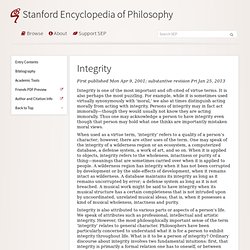
It is also perhaps the most puzzling. For example, while it is sometimes used virtually synonymously with ‘moral,’ we also at times distinguish acting morally from acting with integrity. Persons of integrity may in fact act immorally—though they would usually not know they are acting immorally. Thus one may acknowledge a person to have integrity even though that person may hold what one thinks are importantly mistaken moral views. When used as a virtue term, ‘integrity’ refers to a quality of a person's character; however, there are other uses of the term. Kolb's learning styles, experiential learning theory, kolb's learning styles inventory and diagram. We have some very exciting plans for Businessballs.

Later this month, we will be launching a new visual identity, refreshing the design of the site and adding lots of new functionality to enhance your learning experience. Phase 2 will include badges, learning plans linked to accredited competency frameworks, wikis (for collaborative content development) and new content from international thought leaders and academics. The site will continue to follow our ethos of free work and life learning, and the redevelopment and ongoing management will be delivered by our partner Accipio. If you are interested in contributing content or your view on where we should take businessballs next, please email ask@businessballs.com.
David Kolb's learning styles model and experiential learning theory (ELT) Having developed the model over many years prior, David Kolb published his learning styles model in 1984. Accordingly - especially if you are working with young people - use systems and methods with care.